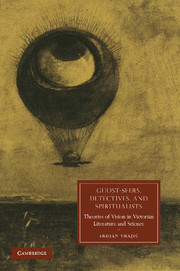Book contents
- Frontmatter
- Contents
- Acknowledgments
- List of abbreviations
- Introduction
- PART I OUTER VISION, INNER VISION: GHOST-SEEING AND GHOST STORIES
- PART II SEEING IS READING: VISION, LANGUAGE, AND DETECTIVE FICTION
- PART III INTO THE INVISIBLE: SCIENCE, SPIRITUALISM, AND OCCULT DETECTION
- 9 Detective fiction's uncanny
- 10 Light, ether, and the invisible world
- 11 Inner vision and occult detection: Le Fanu's Martin Hesselius
- 12 Other dimensions, other worlds
- 13 Psychic sleuths and soul doctors
- Coda
- Notes
- Bibliography
- Index
- CAMBRIDGE STUDIES IN NINETEENTH-CENTURY LITERATURE AND CULTURE
12 - Other dimensions, other worlds
Published online by Cambridge University Press: 06 July 2010
- Frontmatter
- Contents
- Acknowledgments
- List of abbreviations
- Introduction
- PART I OUTER VISION, INNER VISION: GHOST-SEEING AND GHOST STORIES
- PART II SEEING IS READING: VISION, LANGUAGE, AND DETECTIVE FICTION
- PART III INTO THE INVISIBLE: SCIENCE, SPIRITUALISM, AND OCCULT DETECTION
- 9 Detective fiction's uncanny
- 10 Light, ether, and the invisible world
- 11 Inner vision and occult detection: Le Fanu's Martin Hesselius
- 12 Other dimensions, other worlds
- 13 Psychic sleuths and soul doctors
- Coda
- Notes
- Bibliography
- Index
- CAMBRIDGE STUDIES IN NINETEENTH-CENTURY LITERATURE AND CULTURE
Summary
In “The Postulates of the Science of Space,” a lecture delivered in 1874 and published the following year in The Contemporary Review, Clifford begins by humbly paying homage to a book that “has been for nearly twenty-two centuries the encouragement and guide of that scientific thought which is one thing with the progress of man from a worse to a better state.” This vital book is Euclid's Elements, the foundational text of geometry as well as “the inspiration and the aspiration of scientific thought,” since “the aim of every scientific student of every subject was to bring his knowledge of that subject into a form as perfect as that which geometry had attained.” But what begins as a tribute to Euclid soon turns into a eulogy of sorts, though one without a note of sadness. By the 1870s the foundational premises of Euclidean geometry had convincingly been challenged by a number of prominent mathematicians, and Clifford elatedly describes the break from the Euclidean paradigm as a new Copernican revolution: “[T]he transcendent importance of these two changes is that they are changes in the conception of the Cosmos.” Dubbing the Russian mathematician Nicolai Lobachevskii the new Copernicus of geometry, Clifford explains that what the shift from Euclidean to non-Euclidean concepts of space means is that space which we cannot observe is space about which we can say nothing: “knowledge of Immensity and Eternity is replaced by knowledge of Here and Now.” Geometry may still be the model and inspiration for all exact sciences, but its purview is not unlimited.
- Type
- Chapter
- Information
- Ghost-Seers, Detectives, and SpiritualistsTheories of Vision in Victorian Literature and Science, pp. 157 - 180Publisher: Cambridge University PressPrint publication year: 2010

